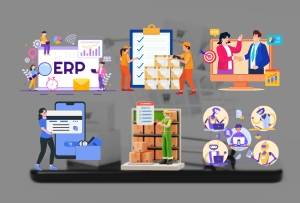From strategy to execution, Experion’s commitment to tech innovation in ecommerce keeps our partners ahead of the curve.
In the world of online retail, having a seamless, connected experience isn’t just a nice-to-have; it’s essential for thriving. In November 2024, Gelato made waves in ecommerce by introducing integration with Amazon, allowing sellers to expand their reach without the hassle of managing inventory, production, or shipping. This partnership highlights how useful ecommerce integration can be in streamlining operations and opening up new opportunities. Ecommerce integration is a powerful solution that bridges your store with key systems like inventory management, shipping, payments, and CRM, allowing your business to run smoothly from start to finish. Imagine an online store where every part of your operation—from order processing to customer support—works in perfect harmony. That’s the beauty of integration.
Implementing ecommerce integration with the right integration software or platform can transform your business, aligning all operations, enhancing customer satisfaction, and paving the way for sustained growth.
What’s Inside This Guide?
- Core Components of integration: APIs, connectors, and tools that connect your systems.
- Real Advantages: The clear-cut benefits that make integration a game-changer.
- Challenges and Fixes: Practical ways to handle common integration hurdles.
- Best Practices for Success: Expert tips to help you maximize your integration efforts.
- Real-Life Success Stories: Inspiring examples of how businesses big and small have thrived with integration.
What is Ecommerce Integration?

Ecommerce integration involves linking your online store with various systems and tools to optimize operations and improve the customer experience. It involves the exchange of data between different software applications, such as your website, inventory management system, accounting software, shipping carriers, and payment gateways.
Why does this matter?
- Meet Rising Customer Expectations: In a digital world where speed and convenience are everything, integration ensures your store delivers a seamless, satisfying experience—meeting and even exceeding customer demands.
- Effortless Operations: Integration automates key tasks, reducing manual work and freeing up your team’s time. This efficiency means more time to focus on growth and innovation.
- Enhanced Customer Satisfaction: Real-time inventory updates, seamless checkouts, and timely order tracking keep customers happy and informed, reducing abandoned carts and boosting loyalty.
- Data-Driven Decision Making: Integration pulls data from across your systems, giving you insights to make informed choices in inventory, marketing, and customer engagement.
- Ready for Growth: As your business grows, integration enables you to scale smoothly, maintaining efficiency without adding complexity.
Why Do You Need Ecommerce Integration?
In the fast-paced digital marketplace, ecommerce integration is a powerful asset for online businesses, delivering key advantages through connected, automated processes. With the help of ecommerce integration platforms, software, and API integrations, you can achieve:
- Increased Efficiency: Automate essential tasks like order processing, inventory updates, and shipping label creation, freeing up time and reducing the risk of manual errors.
- Improved Accuracy: Keep product details, pricing, and stock levels updated across systems with real-time data synchronization, ensuring customers always have access to the latest information.
- Enhanced Customer Experience: Streamlined checkouts, prompt order fulfillment, and responsive customer support contribute to a smooth, positive shopping experience, strengthening customer loyalty.
- Better Decision-Making: Access comprehensive data from across your systems to make informed choices about inventory management, marketing strategies, and customer targeting.
- Scalability: Grow your business seamlessly as ecommerce integration software enables you to scale operations without losing efficiency or accuracy.
How Ecommerce Integration Can Help Your Business
By leveraging ecommerce integration solutions like ecommerce integration platforms and API integrations, your business can unlock new levels of performance and satisfaction:
- Reduced Manual Work: Automation replaces repetitive data entry, minimizing human error and saving valuable time across departments.
- Improved Order Accuracy: Real-time inventory updates help avoid overselling or stockouts, ensuring a smooth and accurate order process.
- Streamlined Shipping: Automation tools simplify shipping label creation and carrier selection, reducing costs and improving delivery times.
- Enhanced Customer Satisfaction: Accurate product information, fast order processing, and efficient support create a seamless shopping experience.
- Boosted Sales: Using integrated customer data, you can refine marketing campaigns and create personalized recommendations, driving revenue and engagement.
- Improved Financial Management: Integration with accounting systems enables automated financial reporting, ensuring accuracy and compliance.
Key Systems and Tools in Ecommerce Integration
 Effective ecommerce integration is about connecting essential tools and systems to create a cohesive, efficient operation that meets customer needs and drives growth. Let’s explore these key systems and how they contribute to a thriving ecommerce environment:
Effective ecommerce integration is about connecting essential tools and systems to create a cohesive, efficient operation that meets customer needs and drives growth. Let’s explore these key systems and how they contribute to a thriving ecommerce environment:
ERP (Enterprise Resource Planning)
The ERP system is the backbone of business operations, functioning as a central hub that synchronizes different aspects of the business:
- Centralized Hub: ERP acts as a centralized system for all critical business data and processes, ensuring seamless coordination across departments like finance, HR, supply chain, and manufacturing.
- Inventory Control: ERP maintains accurate inventory levels across all sales channels, ensuring real-time stock availability and preventing stockouts or overstock situations. By syncing with inventory management, it provides up-to-date data on stock status and availability.
- Order Processing: Automating order processing from start to finish, ERP handles everything from order placement to shipment, reducing manual efforts and minimizing processing errors. Integration with order management tools also ensures seamless fulfillment.
- Financial Management: ERP oversees financial transactions, accounting, and reporting. Integration with financial software keeps transaction records organized, simplifies tax preparation, and aids in compliance.
CRM (Customer Relationship Management)
A CRM system is essential for understanding and building relationships with customers, creating a personalized experience that drives retention and loyalty.
- Customer Data Management: CRM stores detailed customer profiles, including contact information, purchase history, and preferences. This database serves as the foundation for understanding customer behavior and trends.
- Personalized Marketing: Using customer data, CRM enables targeted marketing campaigns. By segmenting customers based on demographics, past purchases, or behaviors, CRM helps tailor communications, improving conversion rates and customer engagement.
- Customer Support: CRM enhances customer support by providing a complete view of customer interactions and purchase history. Support teams can access this information to provide quicker, more personalized responses, resolving issues more effectively.
Inventory Management
Inventory management tools help businesses keep their stock organized and avoid costly errors in supply levels.
- Stock Level Tracking: Real-time stock tracking ensures visibility into inventory levels, enabling accurate forecasting and preventing stockouts or overstock situations. This transparency across locations is crucial for maintaining a smooth supply chain.
- Purchase Order Management: This feature automates and manages purchase orders, ensuring a consistent supply of products. Integrating with suppliers, it helps maintain optimal stock levels and automates reordering based on sales trends or stock thresholds.
- Warehouse Management: Inventory tools streamline warehouse operations, optimizing storage, picking, and packing. This efficiency minimizes fulfillment times and reduces the chance of shipment errors, enhancing the overall customer experience.
Payment Gateways
Payment gateways act as a secure link between a customer’s bank and the ecommerce store, ensuring seamless and protected financial transactions.
- Secure Transactions: Payment gateways encrypt sensitive customer information, such as card details, to protect against fraud and ensure secure payment processing.
- Multiple Payment Options: Supporting various payment methods—credit cards, debit cards, digital wallets, and even Buy Now, Pay Later (BNPL) options—caters to diverse customer preferences, improving checkout conversion rates.
- Fraud Prevention: Payment gateways employ fraud detection measures, like verifying transaction authenticity and flagging unusual behavior, to protect both the business and its customers.
Shipping and Fulfillment Systems
Shipping and fulfillment systems streamline the process of delivering products to customers, optimizing costs and enhancing satisfaction.
- Order Fulfillment Automation: Fulfillment systems automate the packing, labeling, and shipping processes. By integrating with inventory management, they help ensure that the correct items are packed and shipped promptly, minimizing delays and errors.
- Real-Time Tracking: These systems provide real-time tracking updates for both the business and customers. Order tracking not only reassures customers but also reduces customer service inquiries about shipment status.
- Rate Shopping: Fulfillment tools compare shipping rates from various carriers, helping businesses select the most cost-effective shipping options without sacrificing delivery speed or reliability.
Marketing Automation Tools
Marketing automation is vital for reaching and engaging customers consistently across channels, boosting brand presence, and nurturing relationships.
- Email Marketing: Automated email tools personalize campaigns based on customer data, such as abandoned cart emails, product recommendations, and loyalty rewards. By segmenting lists and automating responses, these tools keep customers engaged with the brand.
- Social Media Marketing: Social media management tools allow businesses to schedule posts, monitor engagement, and analyze performance. Integration ensures that social media channels reflect real-time promotions or stock updates, fostering consistent brand messaging.
- Ad Campaign Management: Marketing automation includes tools for managing and optimizing ad campaigns, such as Google Ads and social media ads. By analyzing customer behavior, these tools refine ad targeting, ensuring campaigns reach the right audience and deliver better ROI.
By effectively integrating these systems—ERP, CRM, inventory management, payment gateways, shipping, and marketing automation—businesses can create a streamlined, cohesive ecommerce operation. This holistic integration enhances efficiency, reduces errors, and ultimately leads to better customer experiences and stronger growth.
Benefits of Ecommerce Integration
- Enhanced Efficiency
Ecommerce integration brings automation to the core of business operations, enabling companies to streamline repetitive tasks, reduce errors, and focus more on strategy. Let’s take a closer look at how this works with real-world scenarios:
- Automation of Repetitive Tasks: With integration, tasks like order processing, inventory management, and shipping are automated. For example, when a customer places an order, the system can automatically check inventory levels, initiate the order fulfillment process, and create a shipping label—all without manual intervention. This is particularly valuable during peak shopping seasons, where automated processes prevent bottlenecks and keep operations running smoothly.
- Reduced Manual Error: Automating data entry and calculations drastically reduces the risk of human error. Imagine a scenario where a business manually enters order details across multiple systems; there’s a high chance of discrepancies in product quantities, addresses, or customer information. Integration minimizes these errors, ensuring accurate and consistent data across systems, leading to higher customer satisfaction.
- Increased Productivity: Integration frees up your team to focus on strategic tasks rather than mundane, time-consuming ones. For example, instead of manually tracking orders, team members can analyze sales data or brainstorm customer engagement strategies, ultimately driving business growth.
- Improved Data Accuracy
Accurate data is essential for making informed decisions, managing inventory, and delivering a personalized customer experience. Ecommerce integration maintains consistent data across all customer touchpoints, providing a unified experience.
- Real-Time Inventory Updates: Integration keeps inventory updated in real time. For instance, if a store sells out of a product online, the inventory level adjusts immediately to prevent overselling. This real-time accuracy means customers don’t face frustrating “out of stock” situations, while the business avoids complex inventory management issues.
- Accurate Product Information: With ecommerce integration, product details such as descriptions, pricing, and images remain consistent across platforms. For example, if a fashion retailer updates product descriptions or adjusts prices on their website, this information reflects instantly across all sales channels, minimizing customer confusion and enhancing trust.
- Reliable Customer Data: Integrated CRM systems maintain accurate customer profiles by capturing up-to-date purchase histories, preferences, and contact information. For instance, if a customer updates their shipping address, this information automatically syncs across systems, ensuring a seamless experience during checkout.
- Better Customer Experience
A seamless, satisfying shopping experience is central to customer retention. Ecommerce integration enhances every step of the customer journey.
- Faster Order Processing: With automated workflows, orders move from placement to fulfillment much faster. Imagine a scenario where a customer places an order for next-day delivery. Integrated systems automatically prioritize the order, initiating the fulfillment process instantly to meet the delivery promise, thereby building customer trust.
- Accurate Order Tracking: Real-time order tracking updates allow customers to stay informed on their order’s journey. For example, a customer purchasing electronics can track their package from warehouse dispatch to doorstep delivery. This transparency reassures the customer and reduces order-related inquiries.
- Efficient Customer Support: Integration enables customer support teams to access order histories, shipping status, and customer preferences quickly, allowing them to resolve inquiries faster. Suppose a customer calls to inquire about a delayed shipment; an integrated system provides the support agent with instant access to tracking details, allowing them to provide accurate updates and solutions.
- Scalability
Integration supports business growth by enabling seamless expansion and resource optimization, making it possible to scale without operational strain.
- Flexible Infrastructure: Integration provides a flexible framework that can handle increased demand as the business grows. For instance, during holiday sales, an integrated system can handle a surge in orders without compromising processing speed or accuracy, providing a consistent customer experience.
- Seamless Expansion: When businesses add new products, channels, or markets, integrated systems support this growth without major adjustments. A beauty brand expanding into international markets can, for example, use integration to manage localized product pages, pricing, and shipping logistics for each new market, ensuring a smooth entry without creating separate operational silos.
- Efficient Resource Allocation: Integration allows businesses to allocate resources where they’re needed most. For example, a growing company can automate routine tasks like restocking alerts, allowing warehouse staff to focus on high-priority items or seasonal products.
- Insights and Analytics
Ecommerce integration provides valuable insights, helping businesses make data-driven decisions and understand their customers better.
- Data-Driven Decision Making: Access to integrated data enables informed decisions based on actionable insights. For instance, if sales data shows a high demand for a specific product, management can prioritize restocking efforts and adjust marketing strategies to maximize revenue potential.
- Performance Tracking: With real-time performance metrics, businesses can identify areas for improvement. Suppose a company tracks its abandoned cart rate and finds it’s unusually high. With an integrated system, they can analyze where customers are dropping off (e.g., at the checkout page) and implement targeted solutions to improve conversion rates.
- Customer Behavior Analysis: Integrated data offers insights into customer preferences and buying patterns, which businesses can use to tailor marketing strategies. For example, if analytics show that certain customers frequently purchase outdoor gear, the company can create targeted campaigns for new arrivals in that category, increasing engagement and conversion rates.
Types of Ecommerce Integration

Choosing the right type of ecommerce integration depends on your business’s specific needs, technical resources, and future scalability requirements.
Experion’s unique approach to ecommerce integration empowers brands to thrive in an ever-evolving market landscape.
API-Based Integration
API-based integration uses Application Programming Interfaces (APIs) to enable seamless communication between different systems. APIs act as a bridge, allowing systems to exchange data in real time, following specific protocols and formats. This type of integration is ideal for companies seeking robust flexibility and scalability.
- Flexibility & Customization: APIs allow businesses to tailor the integration to meet specific needs, from syncing inventory across multiple locations to setting up advanced order routing systems. For example, large enterprises can integrate ERP systems with ecommerce platforms, automating complex workflows.
- Data Volume & Speed: API-based integration can handle large amounts of data with high frequency, often updating in real time or near real time. This is critical for ecommerce businesses dealing with rapid changes in inventory or needing immediate order updates.
Plug-and-Play Solutions
Plug-and-play solutions offer pre-built integrations that connect popular ecommerce platforms with other systems, such as CRMs, payment gateways, or marketing tools. These integrations are often available as apps or extensions within an ecommerce platform’s marketplace.
- Ease of Use: Designed for quick deployment, plug-and-play solutions are ideal for businesses without extensive technical resources. Installation is often simple, requiring only basic configuration to start syncing data.
- Speed & Accessibility: This type of integration can be completed in hours, not weeks. For example, an online store can integrate a shipping app to automatically print labels or a CRM app to collect customer information, instantly enhancing capabilities without major setup.
Custom Integrations
Custom integrations involve creating unique, tailored solutions to meet specific business requirements. This approach provides maximum flexibility, often essential for companies with highly specific workflows or complex system architectures.
- Tailored Precision: Custom integrations allow for the exact configuration needed to align with unique business processes. For example, a company could develop a custom solution to sync an ecommerce site with an ERP and a CRM, automating an order-to-fulfillment process that triggers specific alerts, reports, and customer follow-ups.
- Data Complexity & Custom Workflows: Custom solutions handle intricate data flows and enable complex workflows, such as dynamically adjusting pricing across channels or managing intricate inventory reallocation processes. This level of specificity is critical for large, multi-channel businesses or industries with regulatory compliance needs.
Middleware Solutions
Middleware acts as an intermediary layer, connecting various systems and handling data transformation, mapping, and routing. Middleware solutions are ideal for businesses with multiple integrations, enabling them to streamline and centralize data flows across systems.
- Centralized Data Flow: Middleware can aggregate and route data across different systems, helping businesses manage integrations without requiring direct point-to-point connections. For example, it can consolidate orders from multiple ecommerce sites into a single ERP.
- Complex Data Mapping & Transformation: Middleware handles the data formatting and mapping between different systems, ensuring compatibility and reducing the need for custom code. This is particularly beneficial for businesses with diverse tech stacks, allowing seamless data exchange between platforms.
Challenges in Ecommerce Integration
- Data Security: Ensuring data privacy and compliance with industry standards, especially with sensitive customer information.
- System Compatibility: Overcoming issues when systems don’t natively connect, requiring additional tools or custom work.
- Maintenance and Updates: Keeping integrations in sync with platform updates to avoid disruptions.
- Cost and Time: Balancing integration costs and timelines with the business budget, as custom or complex integrations can be resource-intensive.
Best Practices for Successful Ecommerce Integration
- Set Clear Goals: Start by defining what you want to achieve, whether it’s faster order processing, better inventory management, or a seamless customer experience. Knowing your objectives makes it easier to measure success!
- Pick the Right Tools: Choose integration tools that align with your business needs and are easy to scale. Look for platforms and apps that work well with your systems and are reliable in the long run.
- Test Before You Go Live: Run tests to make sure everything works as expected. Testing helps catch any issues early so you can launch smoothly without surprises.
- Keep Security in Mind: Protect customer data and ensure your integration meets security standards. A secure setup builds trust and keeps sensitive information safe.
- Monitor and Tweak Regularly: Once live, keep an eye on performance and make adjustments as needed. Regular monitoring and updates ensure your integration keeps running efficiently as your business grows.
Ecommerce Integration Trends to Watch

As the ecommerce landscape evolves, several integration trends are shaping the future of online retail. Here’s an overview of key developments:
AI and Machine Learning in Integrations
AI and ML are breathing new life into ecommerce, crafting shopping experiences that feel personalized, seamless, and even a bit magical. These technologies analyze customer behavior, predict preferences, and automate tasks, enhancing efficiency and customer satisfaction. For instance, AI-driven CRM systems can provide insights for personalized marketing and sales strategies, allowing businesses to tailor their offerings to individual customer needs.
Omnichannel Integrations
Omnichannel integration focuses on providing a seamless customer experience across multiple channels, both online and offline. By integrating various sales and communication platforms, businesses ensure consistent interactions, whether customers are shopping via a website, mobile app, or in-store. This approach enhances customer satisfaction and loyalty by offering a unified shopping journey.
Headless Commerce
Headless commerce decouples the front-end presentation layer from the back-end ecommerce functionality, offering greater flexibility in delivering custom experiences. This architecture allows businesses to use APIs to deliver content across various devices and platforms, facilitating faster updates and personalized customer interactions. By adopting headless commerce, companies can create tailored shopping experiences that adapt to emerging technologies and customer expectations.
IoT Integration
The Internet of Things (IoT) is being integrated into ecommerce to enhance inventory and supply chain management. IoT devices enable real-time product tracking, monitor storage conditions, and streamline reordering processes through automation. This integration leads to smarter inventory control, reduced waste, and improved operational efficiency, ultimately benefiting both businesses and customers.
Staying abreast of these trends enables businesses to leverage advanced technologies, meet evolving customer expectations, and maintain a competitive edge in the dynamic ecommerce environment.
How Experion Supports Your Ecommerce Integration
 Experion simplifies ecommerce integration, making it easy for your business to operate smoothly, grow, and deliver memorable customer experiences. Here’s how we do it:
Experion simplifies ecommerce integration, making it easy for your business to operate smoothly, grow, and deliver memorable customer experiences. Here’s how we do it:
Custom API Integrations
We build custom API connections that bring your essential tools—like payment gateways, CRMs, and shipping providers—together seamlessly. These integrations keep everything in sync, so your data flows smoothly and accurately.
Scalable Microservices Architecture
Our microservices approach ensures flexibility and scalability, allowing your ecommerce platform to grow without constraints. This modular setup keeps your system resilient and adaptable to evolving needs.
Powerful Data Analytics
Our data analytics integration dives deep into customer behavior, offering insights that fuel smarter, data-driven decisions. From personalizing recommendations to optimizing operations, we help you connect meaningfully with your audience.
Unified Cloud-Based POS Systems
Unite online and in-store sales with our cloud-based POS systems or solutions, providing real-time sync across all channels. This integration streamlines inventory management and creates a seamless customer experience.
Conclusion
Seamless ecommerce integration isn’t just a tech upgrade; it’s the backbone of a thriving business. With Experion by your side, your entire operation—from processing orders to engaging customers—becomes a smooth, interconnected experience. Our tailored API integrations, adaptable microservices, and cloud-based POS solutions ensure your business doesn’t just keep pace; it leads, evolving effortlessly to meet changing demands.
With Experion, you gain a reliable partner committed to transforming your ecommerce integration journey into a driver for growth and efficiency!

